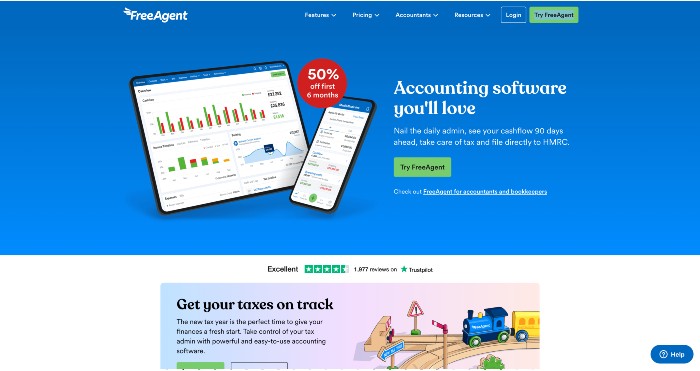If you’re looking to raise funds, a directors loan could be the solution that you’re looking for.
But.. opening a director’s loan account (DLA) might not be the right choice for everyone. When it comes to financing, it’s just one option that’s available for you.
So make sure you’re making the right choice, we’re here to answer what is a directors loan account, why you might need it and what else you need to know before taking one out.
Right, let’s get started then shall we?
What is a director’s loan account?
A director’s loan account is an account that keeps track of all the money you owe (or are owed) via director’s loans. This is where you borrow money from or lend to, your company.
A director’s loan account will have a simple overview of all director’s loans and the amount that is overdrawn, or in credit. For example, let’s say that Abby is the director of an events business. She takes out £5000 from the company to help fix the roof of her home, which has just started leaking.
- By taking out that money, Abby’s director loan account will be £5000 overdrawn.
- The following week, Abby is able to pay back £2000. Her account is now £3000 overdrawn, rather than £5000.
There are certain events where a director may want to lend money to the company instead. If this happens, the account will be in credit – meaning they owe you money. We’ll cover which situations this may happen in and how it works later on in this article.
Lost the buzz for your business?
Starting a business is exciting. Succeeding is rewarding. The bit between is hard, repetitive, and full of self-doubt.
The Lonely Middle Club (From Business4Beginners) helps you through it:
Get support and advice from other small business owners
Remove the self-doubt that’s holding your business back
Learn techniques and strategies to grow your business faster
Be inspired with our exclusive ‘swipe’ file and AI-powered tools
No pressure – work at YOUR pace, towards YOUR goals
—
When can you take out a director’s loan?
You can take a director’s loan at any time. But you can only have one unpaid amount at any one time.
It is money that cannot be classified as, salary, dividends or legitimate expenses. So if you need the money to cover what might be a business expense, instead of taking out a loan, put it through your business’s finances instead.
Need a little help with what allowable expenses you can claim for?
Basically, an allowable expense for a limited company is anything that can be classed as necessary and exclusively for business purposes, such as travel costs, insurance, business expenses, office parties and general office costs.
You can find a full breakdown of allowable expenses for a limited company here.
Is a director’s loan different to paying dividends?

Yes, a directors loan is a lot different to dividends.
- A director’s loan is money your company gives you temporarily, which needs to be paid back to the business.
- A dividend is a lump sum of money that’s paid to its shareholders on a regular basis. This is profit-based and does not need to be paid back.
Dividends can be paid from any limited company to its directors or shareholders. Dividends can only be paid out to shareholders if a company has made profit – so if your company hasn’t made any, you can’t pay dividends.
If a profit has been declared by mistake and you are paid a dividend, this is treated as an ‘accidental’ director’s loan. The amount must be paid back and recorded in your director’s loan account.
Find out more about how dividends work in the UK here.
Can I take out a director’s loan for someone else?
Yes, a director’s loan can be taken out for close family members. The HMRC is pretty clear about that, so you can’t for instance, borrow money from the company to set up an illegitimate lending business and keep the profits.
Your director’s loan must be for yourself, or for someone in your immediate close family. For instance, you could take money out to help pay for your daughter’s university fees.
How much can you borrow in a directors loan?
There’s no limit on how much you can lend from your company in a director’s loan. But, you need to think carefully about how much your company can afford to give. There’s no point in taking out a loan of £15,000 if it prevents your business from running.
If you borrow more than £10,000, you have to treat the loan as a ‘benefit in kind’. This means it must be reported on your self-assessment tax return and could be subject to extra tax. Amounts over this amount tend to need approval by your shareholders as well.
How long do you have to pay back a directors loan?
Although director’s loans don’t have a time limit, they should really be paid within 9 months and one day of a company’s Corporation Tax anointing period. If you don’t pay the money back in this time, you’ll get a heavy tax penalty of 32.5% on any unpaid amount.
What interest do you charge a director’s loan?
You can choose the interest rate that you pay on your director’s loan. However, before you get excited, that doesn’t mean you can take out a completely interest-free loan from your company.
If you charge less interest than the official rate, it will be treated as a ‘benefit in kind’. This means that you’ll be personally taxed the difference and need to report it on your self-assessment tax return. You’ll also have to pay Class 1 National Insurance at a rate of 13.8% of the full value of the loan.
Can you have more than one director’s loan?

Yes, you can take out more than one director’s loan. However, you must wait a minimum of 30 days after repaying one before you take out another.
This is to stop people from committing tax fraud, known as ‘bed and breakfasting’. This is where the director pays a loan off just before the nine-month deadline to avoid Corporation Tax, only to retake the same amount out again after the deadline.
If you start a history of repeat lending, you may get investigated by the HMRC to check that you’re not guilty of this.
Can you loan money to your company?
Yes, you can loan money to your company. This is good for those that want to raise quick capital for their company to cover an expense, such as investing in new equipment.
Again, the interest on this is up to you. Any interest that you do make has to be considered personal income and must be recorded on your self-assessment tax return.
The interest that the business pays is treated as a business expense, which means they must also deduct the basic rate of 20% income tax.
What records do you need to keep for director’s loans?
We’re sure that as a director of a business, you know that there need to be records of all your financial ins and outs. If you need advice on that, check out our guide to bookkeeping here.
Director’s loans are no exception.
- You must keep a director’s loan account as a record of any money that you borrow from, or pay into the company.
- This also needs to be included in the ‘balance sheet’ of your annual accounts that are submitted to the HMRC.
What’s more, you may have to pay tax on director’s loans.
If you’ve borrowed money from the company, your obligations depend on when you paid it back, as this table below shows.
| Paid within 9 months of the end of your Corporation Tax accounting period. | Pay Corporation Tax at 32.5% of the original loan. This can be claimed back once the amount is repaid. |
| The loan isn’t paid within 9 months of the end of your Corporation Tax accounting period. | Pay Corporation Tax at 32.5% of the outstanding amount. Interest will be added until the Corporation Tax or loan is repaid. The Corporation Tax can be reclaimed once the debt has been cleared, but the interest cannot be reclaimed. |
| The loan is written off or released. | Class 1 National Insurance might be deducted through the company’s payroll. You will also need to pay Income Tax on the loan through a self assessment tax return. |
Find out more detail about your obligations on the Gov.uk website.
If you’ve lent your company money, your company does not pay Corporation Tax. However, any interest on the loan counts as both a business expense and a personal income. This means you must:
- Report the income on a personal self-assessment tax return.
- Report the Income Tax for your business every quarter to the HMRC, using form CT61. This can be requested online, or by calling the HMRC.
Can you reclaim corporation tax on a director’s loan?
Yes, you can reclaim Corporation Tax on a director’s loan that’s either been repaid, written off or released. However, you can only reclaim the corporation tax itself – not any additional interest on the tax.
To reclaim this tax, you need to file a claim to the HMRC within 4 years of the full amount being repaid. For the first two years, you can reclaim this by using form CT600A to claim when you prepare a Company Tax Return for that accounting period or amend it online.
If it’s been more than 2 years, you’ll need to use form L2P. This can be posted directly to HMRC, or submitted with your next Company Tax Return. If you wait more than 4 years, you’ll lose out on your tax here.
Any corporation tax will not be rapid until 9 months and 1 day after the end of the Corporation Tax accounting period when the loan was settled.
Sound confusing? The best bet is to leave it up to your accountant, who will be able to fill in the right forms and ensure that you’re able to reclaim the right amount, at the right time.
If you haven’t got an accountant yet, make sure you follow our 5 questions to ask when hiring an accountant to make sure you get your right match.
Need help keeping your books in order?
Business accounting is not an easy task. But if you add in director’s loans, you can quickly get over in your head.
To make the process easier and to help keep your records straight, there’s accounting software. Accounting software is designed to automatically calculate your finances and track the money coming in and going out of your business.
This software can let you upload and store receipts from your phone, send invoices to your clients and prepare your returns instantly. That’s a lot of stress and worry solved quickly.
Which Accounting Software Is Right For You?
Answer 5 multiple choice questions to get a personal recommendation:
To get you started on the right path, we’ve picked out three of our favourites.
1. FreeAgent – Rated 9.4/10
Perfect for day-to-day accounting needs, FreeAgent is the best accounting software suited for small businesses and startups in the UK. And, we definitely put our money where our mouth is here, as it’s the accounting platform that we use at Business4Beginners.
Read the full FreeAgent review here.
2. Quickbooks – Rated 9.3/10
Quickbooks is one of the most popular and well-recognised accounting software platforms in the world. Incredibly user-friendly and stocked with a range of features for companies of all sizes, Quickbooks is one of the best all-rounders in the accounting software business.
Read the full Quickbooks review here.
3. FreshBooks – Rated 9.2/10.
FreshBooks is a platform that has been developed specifically with small businesses in mind. In particular, it’s a great fit for those running businesses that have clients as there are inbuilt time-tracking and project management features.
Read the full FreeshBooks review here.
You can read our full reviews and rankings of the best accounting software here. Or of course, you can hire an accountant to do it all for you.
Top-Rated Accounting Software:
| Accounting Software | Cheapest Package | Ease Of Use | Our Rating | Review | Official Site |
|---|---|---|---|---|---|
 | £19/mo | Excellent | 9.4 | Read Review | Visit Website |
 | FREE | Outstanding | 9.3 | Read Review | Visit Website |
 | £12/mo | Excellent | 9.3 | Read Review | Visit Website |










